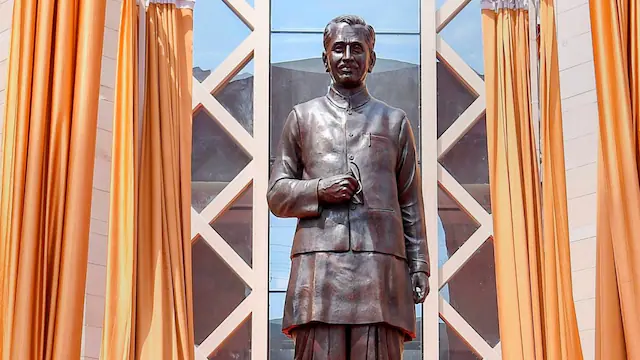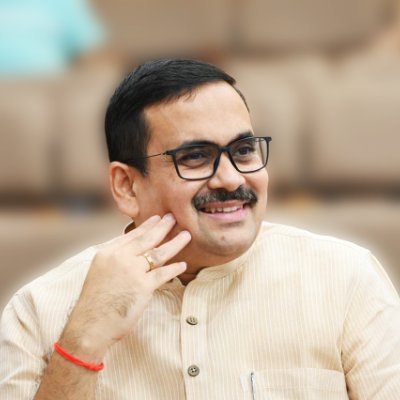One of Prime Minister Narendra Modi’s most enduring achievements of the last 11 years is his emergence as Deendayal Upadhyaya’s true philosophical and political legatee
As early as 1949, Deendayal Upadhyaya articulated the need for “economic, social, cultural as well as spiritual freedom”. Within each of these dimensions, he envisioned the fulfilment of freedom and selfhood. No dimension could be overlooked in his schema for national rejuvenation through integral growth and progress. Over the past eleven years, under Narendra Modi’s leadership, each of these dimensions has received significant focus and innovative action. It is pertinent to briefly examine some of these.
Financial Inclusion: Financial inclusion has broadened and reinforced economic freedom, achieving unprecedented reach and impact in the last eleven years. This is manifested in the flagship Jan Dhan scheme and is evident in the 250 million people lifted out of multidimensional poverty over the past decade. In its Spring 2025 World Bank’s Poverty and Equity Brief, a global poverty update, the World Bank noted a significant decline in extreme poverty in India over the past decade. This sharp decline, from 27.1% to 5.3%, has lifted 171 million people out of extreme poverty. These are definitive indicators of enhanced economic freedom. India’s surpassing of Japan to become the world’s fourth-largest economy further signifies India’s resolute progress towards deepening its economic freedom, marking a decisive milestone in realising this vision.
Social Freedom: The transformative Aspirational District Programme (ADP) exemplifies social freedom. It has accelerated development in India’s most backward districts, fostering social inclusion and mainstreaming the most marginalised within these regions. The ADP is unparalleled in its impact and has overturned the outdated approach of neglecting backward districts. PM Modi has effectively argued that backward districts require greater attention to reach parity with developed areas.
The ADP embodies Deendayal Upadhyaya’s philosophy of “Antyodaya”. The UNDP’s observation that the ADP’s success stems from its alignment with the “Leave No One Behind” philosophy and its direct monitoring by the Prime Minister underscores the driving principles and leadership that transformed this project into a global model for development, all-round growth, and empowerment. The ADP stands as a tribute to Upadhyaya’s philosophy and his exhortation to leave no one behind in the march of progress.
Cultural Freedom: The pursuit of cultural freedom is inspired by PM Modi’s mantra of “Vikaas bhi aur Viraasat bhi” (Development as well as Heritage). The past decade under his leadership has witnessed an unprecedented focus on rejuvenating and preserving India’s cultural symbols and centres. A substantial list of achievements is evident to any cultural enthusiast, scholar, or thinker examining the rejuvenation of India’s cultural landscape. This rejuvenation also restores a collective civilisational confidence.
The renovation of Jagadguru Adi Shankaracharya’s Samadhi in Kedarnath, the reconstruction of the historic Pamban Bridge in Rameswaram, the completion of the Kashi Vishwanath Corridor, the resumption of Navaratri Puja at the Sharda Temple in Kashmir after 1947, the re-establishment of Nalanda University, the groundwork for resurrecting Vikramshila University, the design of the Buddha circuit, preparations for a Bodhgaya corridor, and the launch of Dhamma Yatras with Lord Buddha’s sacred relics are just a few examples of India’s re-establishment and expression of its aspirations for cultural freedom.
The recent Dhamma Yatra in Vietnam witnessed a record 14 million people venerating Lord Buddha’s sacred relics brought from India. These Dhamma Yatras, initiated following PM Modi’s emphasis on spreading the essence of Lord Buddha’s teachings globally, represent an unprecedented outreach in independent India. Not since Emperor Ashoka has India seen such global engagement. Devoid of force, displays of power, or any hint of dominance or hegemony, the Dhamma Yatras are driven by the hope of disseminating shared values. Under PM Narendra Modi, India has resumed its historical civilisational role.
Spiritual Freedom: The desire for spiritual freedom is discernible in PM Modi’s Panch Pran, which fuels the quest for a Viksit Bharat (Developed India). These five pledges reflect the resolve to achieve cultural and spiritual freedom. Deriving pride from our heritage and legacy and dismantling remnants of the colonial mindset are central to this quest.
In the nascent years after independence, during the framing of the Constitution, Deendayal Upadhyaya emphasised five key points. He wrote in late 1948 that the members of the Constituent Assembly had a “pious duty to perform” and that their creations would hold them accountable to future generations.
Upadhyaya’s five suggestions to the framers were: “1. The soul of India must not be suppressed; 2. We must not be trapped in intellectual slavery in the process of emulating others; 3. The path of all-round development for the Indian people must be kept open; 4. The endeavour should be to make India powerful in every way; 5. The forces of fragmentation must be destroyed and Indian unity must be furthered.”
Narendra Modi’s Panch Pran incorporates Upadhyaya’s five suggestions. These are integral to his governance philosophy and actions. The resolve for a developed India, the eradication of colonial vestiges, the embrace of our heritage, the recognition of unity as strength, and the fulfilment of civic duties are aspirations that align with Upadhyaya’s suggestions. Modi’s pledges actively work towards realising Upadhyaya’s vision.
Modi’s call for a “kartavya” (duty)-driven democracy echoes Upadhyaya’s concept of “lok-tantra” (people’s rule) shaped by “lok-kartavya” (people’s duty). In his prefatory remarks to his lectures on Integral Humanism, Upadhyaya argued that “Democracy or people’s rule (Lok-tantra) is a means for upholding Lokadhikar (people’s rights) and promoting Lok-kartavya (people’s duty). Democracy had to be established not only in the political field but in the economic and social fields as well.”
In his pursuit of a “Viksit Bharat” over the last eleven years, Narendra Modi has worked to broaden the base of democracy, embedding it more deeply within the economic and social spheres. One of Modi’s most significant achievements is his emergence as Deendayal Upadhyaya’s true philosophical and political heir. He stands as the foremost and most successful implementer of Upadhyaya’s governance philosophy and his vision for India’s integral resurgence.
(The views expressed are the author's own and do not necessarily reflect the position of the organisation)


